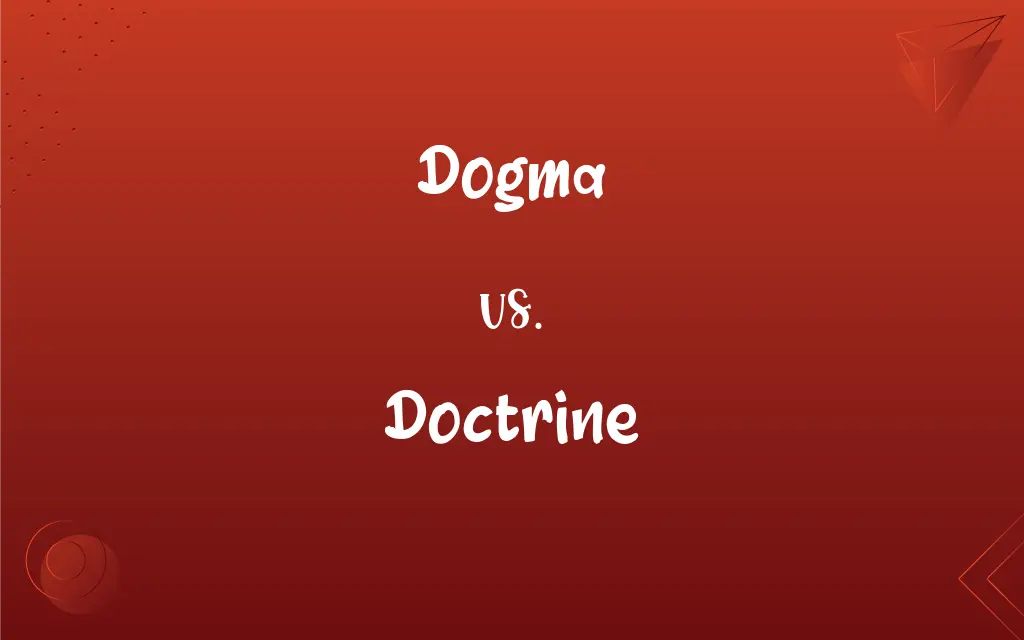Dogma vs. Doctrine: What's the Difference?
Edited by Janet White || By Harlon Moss || Published on November 14, 2023
Dogma is a principle or belief considered to be absolutely authoritative within a religion, while doctrine is a set of beliefs held and taught by a religious, political, or other group.

Key Differences
Dogma refers to beliefs or principles that are viewed as unquestionably true and authoritative within a specific religious context. These beliefs are often deemed essential for the followers of that religion. Doctrine, on the other hand, encompasses a broader range of beliefs and teachings held by a religious, political, or philosophical group, and may be open to interpretation or debate.
Dogma usually carries a sense of being divinely inspired or revealed, making it inviolable and beyond human critique. Doctrine, however, can be the result of human thought, discussion, and consensus, and can evolve or change based on new insights or interpretations.
Dogma can be thought of as the core, non-negotiable tenets of a faith, often central to its identity and practice. Doctrine, while also essential, is more about general teachings and can include various positions on theological or philosophical matters that are not as rigidly defined.
Both dogma and doctrine play vital roles in religious and philosophical systems. While dogma provides foundational truths that are often viewed as eternal and unchanging, doctrine offers a more comprehensive set of beliefs, which can adapt and respond to new understandings or challenges.
Comparison Chart
Definition
Principles viewed as absolutely authoritative.
Set of beliefs held and taught by a group.
ADVERTISEMENT
Origin
Often considered divinely inspired.
Result of human thought or consensus.
Flexibility
Inviolable and non-negotiable.
Can evolve based on new insights or interpretations.
Scope
Core, foundational beliefs.
Broader set of teachings and positions.
Application
Central to a faith's identity and practice.
Offers a comprehensive understanding of beliefs.
Dogma and Doctrine Definitions
Dogma
A principle or belief viewed as incontrovertibly true.
The church's dogma on the nature of the divine was clear.
ADVERTISEMENT
Doctrine
An official policy or position on a particular issue.
The president's foreign policy doctrine was clear and assertive.
Dogma
An authoritative, unchanging belief in a religion.
Followers strictly adhere to the central dogma of their faith.
Doctrine
A stated principle of government policy.
The Monroe Doctrine shaped US foreign relations for many years.
Dogma
A doctrine or body of doctrines concerning faith or morals.
The tenets of the faith are grounded in ancient dogma.
Doctrine
A body of teachings in a particular religious or philosophical system.
Buddhist doctrine promotes compassion and mindfulness.
Dogma
A point of view or tenet put forth as authoritative without adequate grounds.
His ideas, seen as mere dogma, lacked empirical evidence.
Doctrine
A belief or set of beliefs held by a church, political group, or other entity.
The military doctrine has changed in response to new threats.
Dogma
A belief or set of beliefs that are accepted by the members of a group.
The dogma of that political party has shifted over the years.
Doctrine
A principle or body of principles presented for acceptance or belief.
The doctrine of free speech is central to democratic societies.
Dogma
A doctrine or a corpus of doctrines relating to matters such as morality and faith, set forth in an authoritative manner by a religion.
Doctrine
A principle or body of principles presented for acceptance or belief, as by a religious, political, scientific, or philosophic group; dogma.
Dogma
A principle or statement of ideas, or a group of such principles or statements, especially when considered to be authoritative or accepted uncritically
"Much education consists in the instilling of unfounded dogmas in place of a spirit of inquiry" (Bertrand Russell).
Doctrine
A rule or principle of law, especially when established by precedent.
FAQs
Is dogma always religious?
Primarily, but dogma can also refer to beliefs in other contexts that are accepted without question.
Can doctrine change?
Yes, doctrines can change based on new insights or interpretations.
What is dogma?
Dogma refers to beliefs viewed as absolutely authoritative within a specific religious context.
What's an example of a political doctrine?
The Monroe Doctrine, which related to U.S. foreign relations, is an example.
Is every religious belief a dogma?
No, not every belief is dogmatic; many are doctrines open to interpretation.
Are all dogmas doctrines?
Yes, all dogmas can be considered doctrines, but not all doctrines are dogmas.
What is doctrine?
Doctrine is a set of beliefs held and taught by a religious, political, or other group.
Are dogma and doctrine the same?
No, while both relate to beliefs, dogma is often seen as inviolable, whereas doctrine can evolve.
Who determines doctrine?
Doctrines are often determined by religious or political leaders, councils, or assemblies.
How are new doctrines established?
New doctrines can arise from discussions, debates, and consensus among leaders or followers.
Are there non-religious dogmas?
Yes, dogma can also refer to unquestioned beliefs in non-religious contexts, such as political ideologies.
Is dogma specific to Christianity?
No, dogmatic beliefs can be found in various religions around the world.
Can dogma be debated?
Dogmas are usually considered non-negotiable and beyond critique within their specific religious context.
Why is dogma important?
Dogma provides foundational truths for a religion, often central to its identity and practice.
Can doctrine exist outside of religion?
Yes, doctrines can be found in political, philosophical, and other systems.
How does one differentiate between dogma and doctrine in a religion?
Dogma refers to core, non-negotiable beliefs, while doctrine is a broader set of teachings that might be open to discussion.
Can doctrines be foundational to a faith?
Yes, while dogmas are inherently foundational, certain doctrines can also be foundational to a faith.
Who can challenge a doctrine?
Depending on the context, doctrines can be challenged by religious leaders, scholars, or followers.
Why are both dogma and doctrine important in religious contexts?
Both provide a framework of beliefs, with dogma offering foundational truths and doctrine giving a more comprehensive set of teachings.
What happens if one disagrees with a dogma?
Depending on the religion, disagreeing with dogma may result in excommunication or other consequences.
About Author
Written by
Harlon MossHarlon is a seasoned quality moderator and accomplished content writer for Difference Wiki. An alumnus of the prestigious University of California, he earned his degree in Computer Science. Leveraging his academic background, Harlon brings a meticulous and informed perspective to his work, ensuring content accuracy and excellence.
Edited by
Janet WhiteJanet White has been an esteemed writer and blogger for Difference Wiki. Holding a Master's degree in Science and Medical Journalism from the prestigious Boston University, she has consistently demonstrated her expertise and passion for her field. When she's not immersed in her work, Janet relishes her time exercising, delving into a good book, and cherishing moments with friends and family.






































































